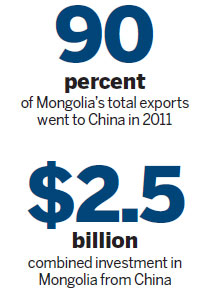China, Mongolia to boost ties
|
|
BEIJING--Mongolia and China will cooperate in a number of mining and energy projects this year, Gombojab Zandanshatar, the visiting Mongolian Minister of Foreign Affairs and Trade, said in an exclusive interview with China Daily on Thursday.
"In Mongolia there are some large scale mining projects to be commissioned soon, and one of them is the Oyu Tolgoi copper and gold mine," the minister said.
Aluminum Corporation of China has reportedly been trying to obtain a share in the Oyu Tolgoi copper and gold mine, but has not succeeded, according to a source from the Mongolian embassy in China speaking on the condition of anonymity. The mine, located near the China-Mongolia border, is one of the world's largest undeveloped copper-gold projects.
In addition, according to an announcement from the Mongolian government last week, China Shenhua Group, a leading mining and energy company in China, has been selected as a stakeholder to jointly develop Mongolia's Tavan Tolgoi coal mine, one of the world's largest unexplored reserves of coking coal, the Wall Street Journal reported.
The Mongolian government selected a consortium including the US-based Peabody Energy, which accounts for 24 percent of the share, China's Shenhua, which accounts for 40 percent and an unidentified Russian-Mongolian group, which accounts for 36 percent.
"Shenhua will play a very important role in the future development of this coking coal deposit," Zandanshatar said.
 |
The source from the Mongolian embassy in China told China Daily that the investment plan has yet to be approved by the Mongolian congress. The investment plan was reportedly previously suspended by Mongolia last October.
"Mongolia is interested in using these mineral resources very efficiently with all its neighbors," Zandanshatar said, adding that China and Mongolia also agreed to address a number of important issues concerning other energy needs for Mongolia.
China is ready to provide petroleum products in the short term, and Zandanshatar hopes the two countries will reach an agreement soon to set up a joint refinery to meet increasing needs of petroleum products in Mongolia, according to a memorandum of understanding signed last year between concerned authorities from both sides.
Over the last decade, China was Mongolia's largest investment and trading partner. "Now in 2011, our bilateral trade turnover increased by two times to $5.7 billion," he said.
By the end of last year, 90 percent of Mongolia's total exports went to China. More than 5,000 Chinese firms operate in Mongolia, with a combined investment of about $2.5 billion, and investment from China continues to increase, according to the minister.
Zandanshatar is paying an official visit to China from Wednesday to Sunday and is scheduled to meet officials from commerce and economic planning agencies.
Foreign Minister Yang Jiechi held a talk with Zandanshatar in Beijing on Thursday morning.
The two sides hailed the progress of bilateral ties and agreed to increase exchanges and cooperation in multiple fields to advance their strategic partnership in a sustainable way, according to a press release.
China and Mongolia established a strategic partnership in June 2011. "We also exchanged our views on how we can best enrich and deepen this partnership through political trust, economic cooperation and humanitarian exchanges," Zandanshatar said.
China's continued growth and stable development have a positive influence on the Mongolian economy and all phases of social development of Mongolia, he said.
"As a neighbor, we enjoy excellent relations and cooperation with China," Zandanshatar said. "We will realize the existing potentials to expand and intensify this cooperation."
The minister also said China's rapid rise is "not a threat" to its neighbors but a great opportunity for development. "I am confident that China needs us as much as we need them in order to achieve a win-win situation," he said.
"We have reconfirmed that both sides fully respect each other's sovereignty, independence and territorial integrity as well as the choice of development paths."
Bilateral cooperation may achieve further substantial progress in many areas, such as infrastructure development, grassroot exchanges and military exchanges, according to the minister.
In recent years, bilateral cooperation in the defense field has become active, so exchange visits of senior officials are now becoming regular and military cooperation is expanding.
In 2011, the Chinese Defense Ministry assisted in building the rehabilitation center of peacekeepers near Ulaanbaatar, Zandanshatar said, adding that both countries should strengthen concrete cooperation by signing military and technical cooperation agreements.
China and Mongolia are expected to work hard to ensure that "people-to-people exchanges, understanding and mutual trust are as good as government-to-government ones", he said.
In 2011, during Premier Wen Jiabao's visit to Mongolia, Wen highlighted the importance of youth exchanges. The first group of 100 youth delegates visited Beijing and Hohhot, Inner Mongolia, last October.
The bilateral strategic partnership is important to encouraging humanitarian exchanges of youth and others between the two countries, Zandanshatar said. "It is better to see once rather than hear a thousand times," the minister said, quoting a Mongolian proverb.
China Daily



















